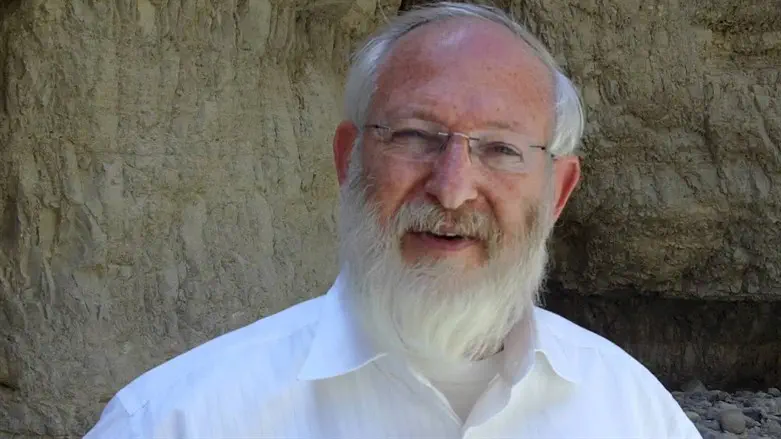
Rabbi David Samsonis one of the leading English-speaking Torah scholars in the Religious Zionist sector in Israel, and an educational entrepreneur. He has founded several schools and written six books, most of which are on the teachings of Rabbi Avraham Yitzchak Kook and Rabbi Zvi Yehuda Kook, who was his mentor.
I have been asked many times during the wars in Gaza and Lebanon, by Jews who live in the Diaspora and who are considering making Aliyah: “We are seriously thinking of coming but wouldn’t I be placing myself and my family in danger if we were to move to Israel now?” Other people have said that Aliyah is a dream for them but they are turned off by all of the ugly fraternal in-fighting bordering on civil war. And there a those who complain about the high taxes and exorbitant housing costs.
My Rabbi at the Mercaz HaRav Yeshiva, HaRav Tzvi Yehuda Kook zts"l, often spoke about the important difference between Bilaam and our forefather Avraham. Bilaam possessed the power to direct the sources of evil by channeling the instant of Divine Wrath which exists in the world every day (Berachot 7A). Bilaam’s essential character was to curse and to wage war against goodness and truth. He gazed on the world with an evil eye (Zohar, Achrei Mot, 63B). In the “Ethics of the Fathers,” it is explained that everyone who has a good eye is a student of our forefather, Avraham Avinu (Ethics of the Fathers, 5:19).
Avraham was filled with love and sympathy for the world. He loved G-d and he loved mankind (Ibid., 6:1). He looked at the world in a positive light. Out of his great love for G-d, he moved his family to the Land of Israel even though it was filled with idol worshippers and uncivilized people. Avraham had the special trait of a positive and empathetic eye. His opposite, someone possessed with an evil eye, is a student of Bilaam, the wicked.
Seeing the Land of Israel with an sympathetic eye is a trait that the Jewish people inherited from Avraham, our father. This trait also stands out in Moses, who viewed the Land in a positive light. “I pray Thee, let me go over and see the good Land that is beyond the Jordan, and the goodly mountain region and the Lebanon,” (Devarim, 3:25). He yearns for the Land even though he knows it is filled with hostile enemies who the Jewish People will have to conquer in war.
Joshua and Calev ben Yefuneh also possessed this great love and positive orientation towards the Land of Israel. In the wilderness, spies were sent out to reconnoiter the Land. They came back with a disheartening report, discouraging the people from journeying on to the Promised Land because it was filled with fearsome giants. They said, “We are not able to go up against the people, for they are stronger than we are” (Bamidbar, 13:31). They spread an evil report of the Land, saying, “The Land that we have spied out is a Land that eats up its inhabitants” (Ibid. 13:32).
Of the twelve spies, nly Joshua and Calev stood up in defense of the Land, declaring, “The Land which we spied out is an exceedingly good Land…a Land which flows with milk and honey. Rebel not against the L-rd, nor fear the people of the Land, for they are like bread before us; their defense is departed from them, and the L-rd is with us, fear them not” (Ibid. 14:7-8).
The importance of having a positive orientation towards the Land of Israel is once again seen as the Jewish People are about to enter the Land after their forty years of wandering in the wilderness. The tribes of Reuven, Gad, and half the tribe of Menashe decided that they would rather receive their inheritance on the eastern bank of the Jordan, and not join in the fight to conquer the seven nations dwelling in the heartland of Israel. Moshe rebukes them for rebelling against the commandment of the L-rd and for discouraging the will of the people, saying, “Shall your brethren go to war and you sit here? And why do you dishearten the Children of Israel from going into the Land which the L-rd has given them?” (32:6-7).
Inspired by Moses’s chastisement, these three tribes rallied themselves, not only to join in the fight, but to lead the way into battle during the seven years of conquest, before returning to their families on the other side of the Jordan. Their bravery and spirit of self-sacrifice for the Land of Israel has stood by the Jewish People for thousands of years.
One thing must be clear – the Land of Israel belongs to all of the Jewish People. Not only all the Jews living in Israel must rise up to defend it. All of us are called upon to take a part in the Milchemet Mitzvah (obligatory war) - a war of pikuach nefesh - which paves the way to Israel’s Redemption, for it is the resettlement of the Land of Israel and the establishment of Jewish sovereignty over its borders which provides the foundation for the Redemption of the Jewish Nation as a whole.
Yes there are dangers and problems involved in the re-conquest and settlement of our eternal Homeland. But by drawing inspiration from our holy and faith-filled Forefathers, and by looking at the challenges we face with a good eye, just as they did, trusting in Hashem and knowing that the very challenges are the harbingers of salvation, we draw down the Heavenly blessing with insures the success of our endeavors, paving the way to coming of Mashiach, the rebuilding of the Beit HaMikdash, and the T’shuva of all of the Nation, may it be soon.